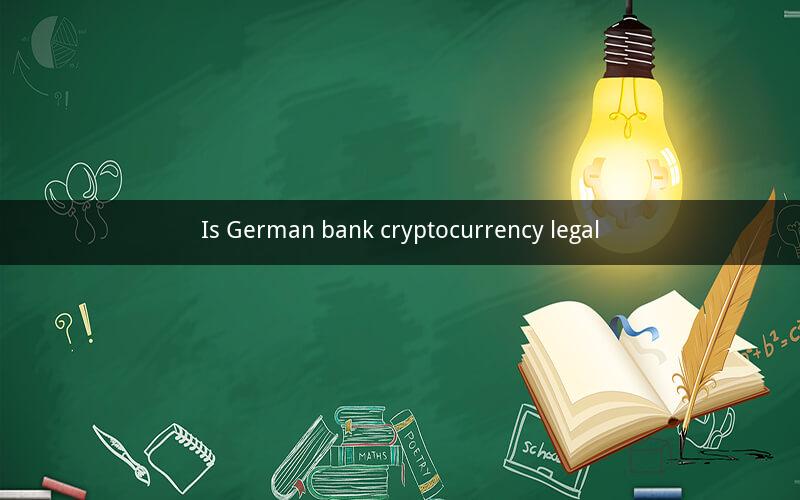
Table of Contents
1. Introduction to Cryptocurrency in Germany
2. Legal Framework for Cryptocurrency in Germany
3. Regulations for German Banks and Cryptocurrency
4. Risks and Challenges Associated with Cryptocurrency in Germany
5. German Banks and Cryptocurrency Exchanges
6. The Role of Financial Supervisory Authority (BaFin)
7. Future Outlook for Cryptocurrency in Germany
8. Conclusion
---
1. Introduction to Cryptocurrency in Germany
Germany has emerged as a prominent hub for blockchain technology and cryptocurrency adoption. With its robust economy and technology-savvy population, Germany has witnessed a significant surge in the interest and investment in cryptocurrencies. Bitcoin, Ethereum, and other altcoins have gained widespread attention, prompting various stakeholders, including banks, to explore their role in this emerging sector.
2. Legal Framework for Cryptocurrency in Germany
The legal framework for cryptocurrencies in Germany is governed by the German Banking Act (Kreditwesengesetz) and the German Payment Services Supervision Act (Zahlungsdiensteaufsichtsgesetz). These laws define the legal status of cryptocurrencies and outline the responsibilities of financial institutions, including banks, in relation to them.
Under the German legal framework, cryptocurrencies are classified as "virtual currency" and are not recognized as legal tender. However, they are not illegal, and German banks can engage in transactions involving cryptocurrencies, provided they comply with the relevant regulations.
3. Regulations for German Banks and Cryptocurrency
German banks are subject to strict regulations when dealing with cryptocurrencies. These regulations include:
- Anti-Money Laundering (AML) and Counter-Terrorist Financing (CTF) Measures: Banks must implement robust AML/CTF measures to prevent the use of cryptocurrencies for illegal activities such as money laundering and financing terrorism.
- Know Your Customer (KYC) Requirements: Banks must verify the identity of their customers and conduct due diligence on them to ensure they are not involved in any suspicious activities.
- Regulatory Reporting: Banks must report transactions involving cryptocurrencies to the German Financial Supervisory Authority (BaFin) and other relevant authorities.
4. Risks and Challenges Associated with Cryptocurrency in Germany
Despite the growing interest in cryptocurrencies, German banks face several risks and challenges when engaging in this sector. These include:
- Market Volatility: Cryptocurrency markets are highly volatile, leading to potential financial losses for banks and their customers.
- Regulatory Uncertainty: The regulatory landscape for cryptocurrencies is still evolving, and banks must stay updated on the latest developments to ensure compliance.
- Cybersecurity Threats: Cryptocurrency transactions are susceptible to cyber attacks, which can compromise the security of customer funds.
5. German Banks and Cryptocurrency Exchanges
Several German banks have entered the cryptocurrency market, offering various services, including:
- Cryptocurrency Trading: Some banks have partnered with cryptocurrency exchanges to allow their customers to trade cryptocurrencies directly through their platforms.
- Storing Cryptocurrency: German banks offer cryptocurrency storage solutions, including cold storage and multi-factor authentication to enhance security.
- Blockchain Solutions: German banks are exploring the use of blockchain technology to streamline their operations and offer new financial services.
6. The Role of Financial Supervisory Authority (BaFin)
BaFin plays a crucial role in regulating the cryptocurrency market in Germany. The authority ensures that banks and other financial institutions comply with the relevant regulations and supervises the overall financial market. BaFin also provides guidance to banks on the best practices for dealing with cryptocurrencies.
7. Future Outlook for Cryptocurrency in Germany
The future of cryptocurrency in Germany appears promising. As the technology continues to evolve, German banks are expected to expand their offerings in this sector. Additionally, the regulatory framework is likely to become more robust, providing clarity and stability to the market.
8. Conclusion
Germany has made significant strides in embracing cryptocurrency technology. With a supportive regulatory framework and a growing interest in this sector, German banks are well-positioned to play a pivotal role in the future of cryptocurrency.
---
Questions and Answers
1. What is the legal status of cryptocurrencies in Germany?
Cryptocurrencies are classified as "virtual currency" in Germany and are not recognized as legal tender. However, they are not illegal.
2. Can German banks engage in cryptocurrency transactions?
Yes, German banks can engage in cryptocurrency transactions, provided they comply with the relevant regulations, including AML/CTF measures and KYC requirements.
3. What are the main risks associated with cryptocurrency for German banks?
The main risks include market volatility, regulatory uncertainty, and cybersecurity threats.
4. How do German banks ensure the security of cryptocurrency transactions?
German banks implement robust cybersecurity measures, including cold storage and multi-factor authentication, to enhance the security of cryptocurrency transactions.
5. What role does BaFin play in regulating the cryptocurrency market in Germany?
BaFin ensures that banks and other financial institutions comply with the relevant regulations and supervises the overall financial market.
6. Are there any restrictions on the use of cryptocurrencies in Germany?
There are no restrictions on the use of cryptocurrencies in Germany, but they are not recognized as legal tender.
7. How can German banks benefit from the growing interest in cryptocurrency?
German banks can benefit from the growing interest in cryptocurrency by offering new financial services and expanding their customer base.
8. What are the main challenges faced by German banks in the cryptocurrency market?
The main challenges include market volatility, regulatory uncertainty, and cybersecurity threats.
9. How can German banks ensure compliance with the relevant regulations in the cryptocurrency market?
German banks can ensure compliance by staying updated on the latest developments, implementing robust AML/CTF measures, and conducting due diligence on their customers.
10. What is the future outlook for cryptocurrency in Germany?
The future of cryptocurrency in Germany appears promising, with German banks expected to play a pivotal role in the sector.